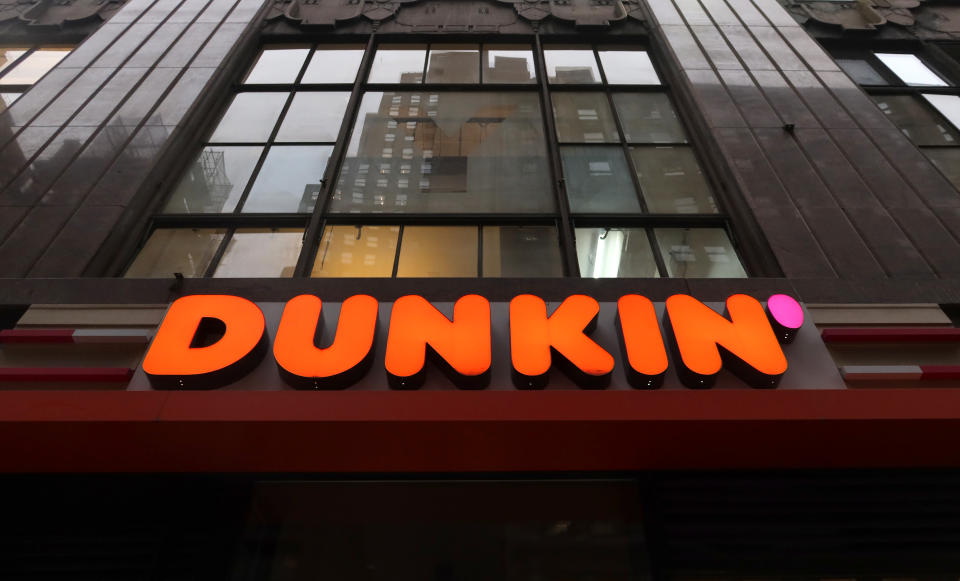Dunkin' Brands CEO: Our Q2 performance proves we are navigating through COVID-19
Dunkin’ Brands (DNKN) is moving quickly to put a challenging second quarter at the hands of the COVID-19 pandemic in the rearview mirror.
The early data suggests it’s doing just that as the U.S. economy slowly comes back to life and restaurants reopen for dine-in service.
Dunkin’ Brands CEO David Hoffmann tells Yahoo Finance Dunkin’ U.S. same-store sales are running down by a “very low-single digit percentage” in July. Results are being fueled by demand for espresso-based coffees, matcha lattes and plant-based meat sandwiches (using supplier Beyond Meat).
The restaurant chain said Thursday that second quarter same-store sales in the U.S. fell 18.7% at Dunkin’ and by 6% at Baskin Robbins. Dunkin’ missed analyst forecasts on earnings, but did slightly beat on sales.
Here’s Dunkin’ Brands’ quarterly results compared to Bloomberg estimates:
Shares of Dunkin’ brands dropped about 4% in Thursday afternoon trading.

“I think there's a lot of brands that talk about navigating through this crisis, and we're backing it up with performance. And we've been working around a menu evolution and digital transformation, and then offering the greatest amount of convenience and access to the customer on their terms,” Hoffmann said.
Although the path forward for restaurants remains fraught with risk, that isn’t stopping Dunkin’ from staying aggressive on its own evolution. Hoffmann says the company has added 1,400 pickup locations in a bid to serve customers worried about lingering too long inside the restaurant. Moreover, the company is developing a new restaurant prototype that makes it easier to pick up mobile orders and get out of the store.
To that end, Dunkin’ acknowledged today it will close 800 restaurants in the U.S. and 350 overseas as part of a portfolio review.
“We are assessing our real estate portfolio and working with our franchisees to permanently close off-strategy, low volume sales locations. Earlier this year that we expected to close 450 Speedway self-serve kiosk locations during fiscal 2020, representing less than 0.5 percent of system-wide sales. Including the 450 Speedway closures, we believe there could be approximately 800 low-volume locations, primarily alternative points of distribution, that may close. If all 800 of these locations were to close, they would represent 8 percent of the Dunkin’ U.S. total restaurant footprint, but only around 2 percent of system-wide sales, inclusive of the Speedway closings,” a Dunkin’ Brands spokesperson told Yahoo Finance via email.
They added, “Most of these locations are also unprofitable for the franchisees and are well below average for both sales and profitability. More importantly, for many of these franchisees, closing these restaurants will enable them to invest in remodels, new restaurants, and potentially relocate some to higher-traffic areas, or to areas where they can add a drive-thru. We expect most of these closings will take place this year and will position us and our franchisees for more profitable future growth.”
Brian Sozzi is an editor-at-large and co-anchor of The First Trade at Yahoo Finance. Follow Sozzi on Twitter @BrianSozzi and on LinkedIn.

 Yahoo Finance
Yahoo Finance 